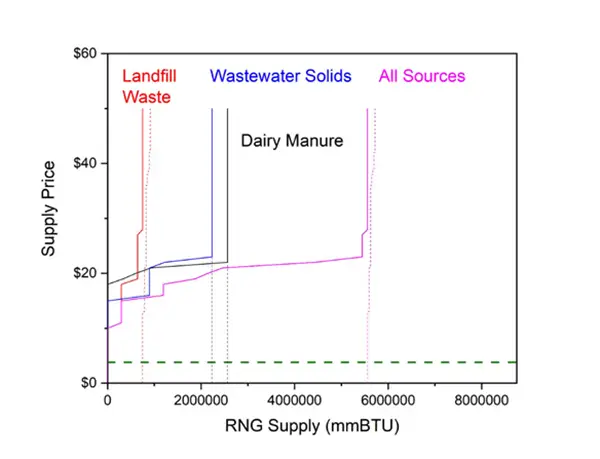Renewable natural gas (RNG) often generates usable energy from waste products, reduces methane emissions when it replaces fossil fuel use, and creates new revenue streams for producers.
However, not all RNG projects are financially or technically feasible. We assessed the total RNG potential of currently available local waste feed-stocks in the state of Minnesota and analyzed the financial and technical limitations for project development.
We found that under ideal production conditions, the potential to make RNG from municipal solid waste, dairy and hog farm manure, and municipal wastewater solids in the state could replace less than 10 percent of Minnesota’s current use of conventional natural gas. We found that technical and financial factors such as project size, financing, and distance to an existing pipeline further reduce the number of feasible RNG project sites in Minnesota.

“Virtual pipelines” exist, which transport RNG short distances by truck to pipeline injection stations; these improved the modeled profitability of 66 out of 116 projects (57 percent) by decreasing transmission costs.
We found that no RNG projects are financially feasible without state or federal renewable fuel credit programs such as the Department of Energy’s Low Carbon Fuel Standard credit system. This is because direct sale of RNG alone does not return enough revenue to cover project costs.
Dairy manure projects have the lowest cost of energy, the highest total revenue, and the shortest payback period compared to similar-sized projects generating RNG using municipal solid waste and in wastewater treatment plants.
However, this difference is because manure anaerobic digestion projects are eligible for larger LCFS credits than the other projects. The LCFS credit system also limits end-use of the RNG to vehicle fuel.
Our results help specify how much of current natural gas use in Minnesota replaceable via RNG projects.
Author Affiliations
- Alicia Hoffman, UW–Madison Department of Atmospheric and Oceanic Sciences and Center for Sustainability and the Global Environment graduate student, abhoffman3@wisc.edu
- Unni Kurumbail, UW–Madison Department of Chemical and Biological Engineering graduate student, ukurumbail@wisc.edu
- Noah Rhodes, UW–Madison Department of Electrical and Computer Engineering graduate student, nrhodes@wisc.edu
- Jamey Anderson, U.S. Department of the Interior attorney-advisor
- Robert Anex, UW–Madison Wisconsin Energy Institute, Department of Biological Systems Engineering, and Nelson Institute professor, anex@wisc.edu